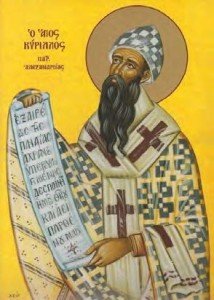The whole spiritual experience reflected in Cyril’s Christology implies two central intuitions: (1) God, in the search for incomplete humanity, does not stop halfway, but goes where humanity it – in death itself; and (2) It is not an ideal, perfect humanity that the Son of God assumes, but with an incomplete humanity which, albeit incomplete, has the potential give to it by God to come into greater communion with God. God assumes humanity which is made in His image but has not actualized, necessarily, His likeness. It is corrupt and mortal.
During the very bitter christological debates and controversies, the Christology of Cyril was challenged from two sides: (1) First, the school of Theodore of Mopsuestia, eventually condemned in the person of Nestorius, not only reflected a legitimate concern for the full and free humanity of Christ but also attempted to rationalize the mystery (How could the eternal Son “be born”? How could the passionless God “suffer and die”? It accepted as absolute the Greek Platonic philosophical category of divine changelessness, which excluded such realistic affirmations as a divine birth in time or the death of the Son of God on Golgotha. (2) Second, the Cyrillian view of Jesus Christ was also challenged by those who interpreted it in an “Apollinarian” sense. Again on the basis of Platonism, Apollinaris, bishop of Laodicea, saw Jesus as God with a human body but without a human soul: why, indeed was there a need in him for another spiritual center beside the divine Logos? But then was he truly a man, since he was lacking a distinctively human spiritual identity? Even more sophisticated than Apollinarianism, the teaching of Julian of Halicarnassus claimed that, since death came “through sin”, the sinless humanity of Jesus could not be affected by corruptibility and of course mortality. The consequence was that the humanity of Jesus was perfect, incorruptible humanity, in the sense of not being fully like our incomplete nature, and that therefore his death was not like our death.
You can tell that the Church as struggled through its history to truly understand WHO JESUS IS. How do we conceive of the mystery of Him being both FULLY God and FULLY man. This, albeit mystery, has troubled humans since the time of Christ. All kinds of arguments have immerged.
What is your belief about Jesus, the Christ?

